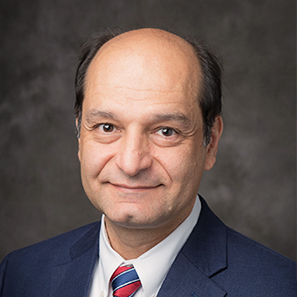
Behzad Mortazavi
Adjunct
Affiliate Faculty
- beyzadm@syr.edu
- (315) 443-3949
- Website
- Not Accepting Students
Education
- Ph.D., Department of Oceanography, Florida State University, 1998
Research Interests
In my lab we study biogeochemical cycles in terrestrial and marine ecosystems, with a particular emphasis on how naturally occurring perturbation and anthropogenic activities are impacting the transformations of Carbon and Nitrogen.
We use a combination of field and laboratory efforts and use stable isotopes as well as other state-of-the-art tools and equipment to understand processes in variety of environments ranging from headwater streams, large river, estuaries, marshes, and coastal oceans.
The lab’s research interests are broad and interdisciplinary, requiring collaboration with oceanographers, hydrologists, chemists, microbial ecologists, and plant physiologists. We are currently investigating the impact of oil spills on nitrogen cycling in nearshore marine ecosystems as well as the role of different marsh vegetation types on nitrogen cycling.
For detailed information on our current projects see my webpage.
Selected Publications
- Ledford, T. C., Mortazavi, B., Tatariw, C., & Mason, O. U. (2020). Elevated nutrient inputs to marshes differentially impact carbon and nitrogen cycling in two northern Gulf of Mexico saltmarsh plants. Biogeochemistry, 149: 1–16.
- Nickerson, Z. L., Mortazavi, B., & Atkinson, C. L. (2019). Using functional traits to assess the influence of burrowing bivalves on nitrogen-removal in streams. Biogeochemistry, 146: 125–143.
- Tatariw, C., Flournoy, N., Kleinhuizen, A. A., Tollette, D., Overton, E. B., Sobecky, P. A., & Mortazavi, B. (2018). Salt marsh denitrification is impacted by oiling intensity six years after the Deepwater Horizon oil spill. Environ Pollut, 243: 1606–1614
- Domangue, R. J., & Mortazavi, B. (2018). Nitrate reduction pathways in the presence of excess nitrogen in a shallow eutrophic estuary. Environ Pollut, 238, 599–606.
- Jacquot, M. P., Dorgan, K. M., Mortazavi, B., Kleinhuizen, A. A., & Clemo, W. C. (2018). Macrobenthic community structure and influence on denitrification capacity in soft sediments (Mobile Bay, Alabama, USA). Marine Ecology Progress Series, 605: 17–35.
- Kleinhuizen, A. A., & Mortazavi, B. (2018). Denitrification capacity of a natural and a restored marsh in the Northern Gulf of Mexico. Environmental Management, 49: 1–11
- Urakawa, H., Rajan, S., Feeney, M. E., Sobecky, P. A., & Mortazavi, B. (2018). Ecological response of nitrification to oil spills and its impact on the nitrogen cycle. Environ Microbiol, 21: 18–33.
- Alberti, J., Cebrian, J., Alvarez, F., Escapa, M., Esquius, K. S., Fanjul, E., et al. (2017). Nutrient and herbivore alterations cause uncoupled changes in producer diversity, biomass and ecosystem function, but not in overall multifunctionality. Sci Rep, 7(1), 2639